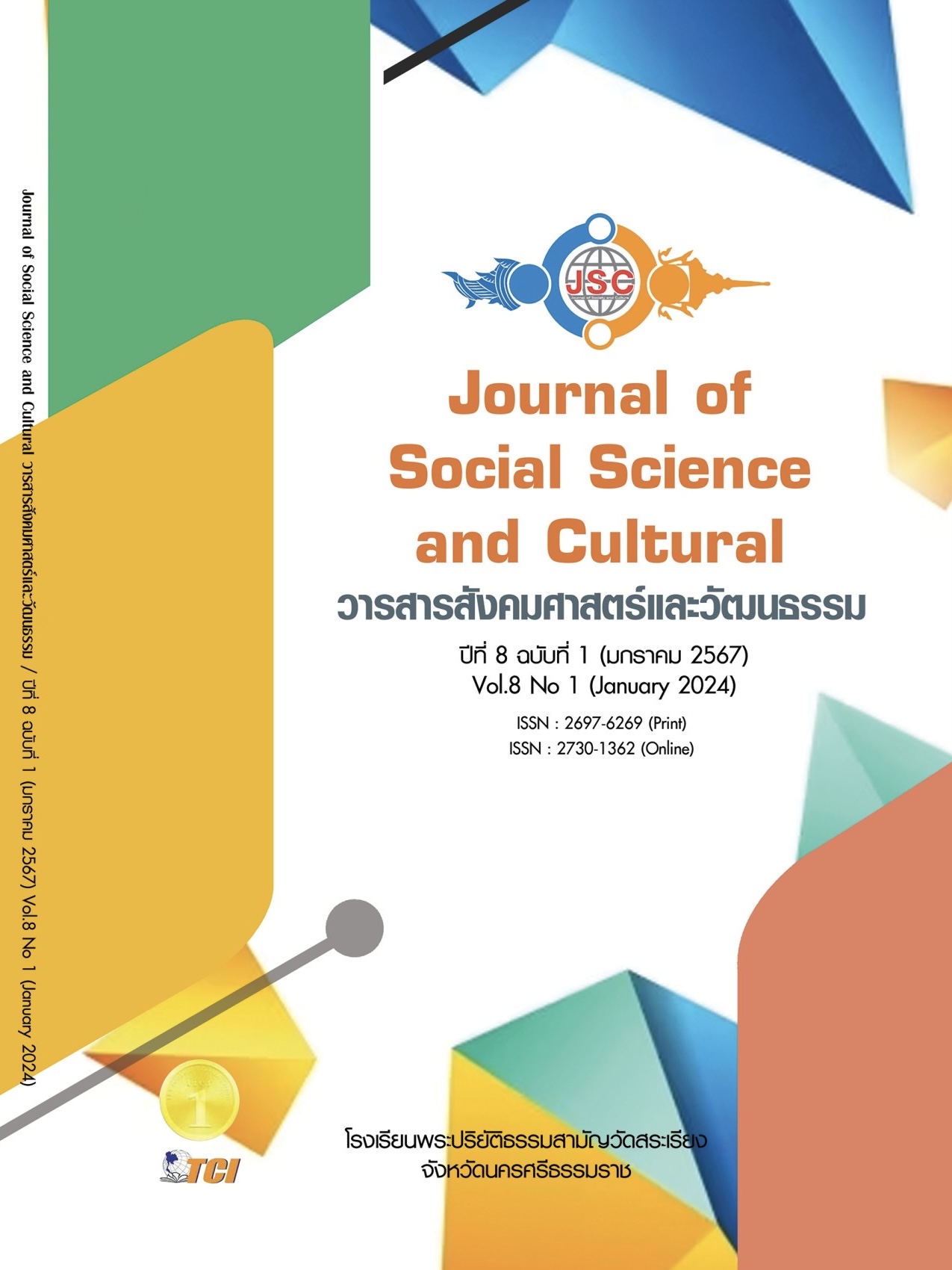THE DEVELOPMENT OF A COLLABORATIVE NETWORK FOR TEACHERS’ LEARNING MANAGEMENT COMPETENCY IN DIGITAL AGE OF EDUCATION NETWORK CENTER 19 UNDER SAKON NAKHON PRIMARY EDUCATIONAL SERVICE AREA OFFICE 2
Main Article Content
Abstract
The purposes of this research aimed to examine the components of learning management competency, needs, guidelines, and the effects of collaborative network development on teachers’ learning management in the digital age. The research was conducted through a two-cycle participatory action research (PAR) approach. The target area for development included teachers from nine different schools affiliated with the Educational Network Center 19. The co-researchers consisted of a researcher, 28 master teachers, and 18 key informants. The findings were as follows: 1. Teachers’ competency in learning management in the digital age encompassed five key components: 1) Digital knowledge and skills, 2) Teacher leadership, 3)School curriculum development, 4) Learning management in the digital age, and 5) Teamwork; 2. The prioritized need was outlined as follows: 1) Formulating objectives, 2) Establishing network members, and 3) Engaging network members in collaborative task performance. The need for cultivating competency in learning management ranged respectively that involved: 1) Teacher leadership, 2) School curriculum development, 3) Learning management in the digital age, 4) Teamwork, and 5) Digital knowledge and skills; 3. The guidelines for establishing a collaborative network were clarified through workshops, sub-group meetings, knowledge-sharing sessions, and development during practice; 4. The effects on the collaborative network development were: 1) 27 master teachers recruited 43 new network members, 2) Students studying under master teachers, and teachers serving as network members, demonstrated their learning achievements at a level higher than the established criteria. Moreover, their desirable characteristics and competency reached an excellent level, and 3) the schools have been honored with academic awards at the educational area, regional, and national levels.
Article Details
References
กลุ่มนิเทศการจัดการศึกษาสำนักงานเขตพื้นที่การศึกษาประถมศึกษาสกลนคร เขต 2. (2566). บทสรุปผู้บริหาร. สกลนคร : สำนักงานเขตพื้นที่การศึกษาประถมศึกษาสกลนคร เขต 2.
คณะกรรมการข้าราชการพลเรือน. (2565). โครงการพัฒนาทักษะความเข้าใจและใช้เทคโนโลยีดิจิทัล. กรุงเทพมหานคร: สำนักงานคณะกรรมการข้าราชการพลเรือน.
ฉัตรชัย หวังมีจงมี. (2560). สมรรถนะของครูไทยในศตวรรษที่ 21 : ปรับการเรียน เปลี่ยนสมรรถนะ. วารสาร สถาบันเสริมศึกษาและทรัพยากรมนุษย์ มหาวิทยาลัยธรรมศาสตร์, 12(2), 47-63.
ไชยา ภาวะบุตร. (2565). ภาวะผู้นำทางวิชาการ. สกลนคร: มหาวิทยาลัยราชภัฎสกลนคร.
วิวัฒน์ เพชรศรี และธีรพงษ์ จันเปรียง. (2561). การพัฒนาหลักสูตรฝึกอบรมเชิงปฏิบัติการ เรื่องบทบาทชาวของที่มีต่อสมเด็จพระเจ้าตากสินมหาราช เพื่อเป็นข้อมูลพื้นฐานในการพัฒนาหลักสูตรสถานศึกษา. โครงการวิจัยงบประมาณแผ่นดิน. จันทบุรี: มหาวิทยาลัยราชภัฏรำไพพรรณี.
สำนักงานคณะกรรมการข้าราชการพลเรือน. (2558). การปรับใช้สมรรถนะในการบริหารทรัพยากรมนุษย์. กรุงเทพมหานคร: สำนักงานฯ.
สุกัญญา แช่มช้อย. (2560). การบริหารสวิทยถานศึกษาในยุคดิจิทัล. (พิมพ์ครั้งที่ 1). พิษณุโลก: พิษณุโลกดอทคอม.
องอาจ นัยพัฒน์. (2551). การออกแบบการวิจัย : วิธีการเชิงปริมาณ เชิงคุณภาพ และผสมผสานวิธี. กรุงเทพมหานคร: สำนักพิมพ์แห่งจุฬาลงกรณ์มหาวิทยาลัย.
Paul Starkey. (1997). Networking for Development. London: International Forum for Rural Transport and Development.
Phuangsomjit. (2014). Participatory Action Research on Research in Educational Administration. (Book 2 (Unit 6-10); 3rd edition). Bangkok: Sukhothai Thammathirat Open University. (in Thai).


